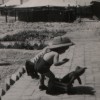Do you struggle to write a one page synopsis?
Do you struggle to write a one page synopsis?
A lot of literary agents ask for a one page synopsis of a novel, but I personally find it difficult to write one that short. A synopsis is supposed to be your novel in miniature, including all the plot twists and characters. But I seem to struggle with it even with books under 50,000 words. Does anyone else have this problem? How do you know what to cut while still making it sound interesting?Now you’ve depressed me even more. I thought I would just take my novel to a Literary Agent or a Publisher and show it to them. They would then rush around for a while and make a few phone calls, telling everybody what a wonderful work of art that had been presented to them. And that would be it; apart from the enormous cheques and film rights negotiations.
Hmm! One page synopsis. Not my idea of fun.I think it's an excellent synopsis. All you have to do is to come up with 50,000 words describing this frantic running around in ecstasy and cash flow in a laundromat...
Brilliant (if tongue in cheek) answer, as ever, my dear friend.
Watch out for this person, everybody. She has a mind like a razor blade; a writing style far in excess of the norm.
Couldnt tell ya how to do it. I had enough of a problem writing just a paragraph without spoiling everything about whatever it was I was writing about. Then when I rewrote it without the tsunami of spoilers, it was bland.
To start off, here is the first part of the plot summary/synopsis of Ernest Hemingway’s “The Old Man and the Sea” off the Wikipedia page:
“The Old Man and the Sea is the story of a battle between an old, experienced fisherman, Santiago, and a large marlin. The novel starts by telling the reader that Santiago has gone 84 days without catching a fish, considered "salao", the worst form of unluckiness. He is so unlucky that his young apprentice, Manolin, has been forbidden by his parents to sail with him and been told to, instead, fish with successful fishermen. The boy visits Santiago's shack each night, hauling his fishing gear, preparing food, talking about American baseball and his favorite player Joe DiMaggio. Santiago tells Manolin that on the next day, he will venture far out into the Gulf Stream, north of Cuba in the Straits of Florida to fish, confident that his unlucky streak is near its end…”
Now, if you know the rest of the story and know it well, you’ll agree that that this is not just another fishing story. Sure, a quick read of this story would leave you to believe just that, but a close reading of it will reveal to you an epic tale about our Faith in God. The villagers back in the town could be interpreted as heathens. The boy was told by his folks to look not to the Old Man Santiago, but other more “successful” fisherman in town for mentorship or leadership. But he never lost faith. In the Old Man. His faith in the Santiago was unrelenting so he was compelled to hang on every word the Old Man spoke. And how that the Old Man prove that there IS a God? The bones of the marlin/Jesus was towed back by him to prove that He does exist, that’s how.
The book is small--only 127 pages long but it speaks volumes about Man’s struggle to find God, including his struggle against the force of nature as well (There is Christ imagery throughout the entire book by the way). One idea that I learned from my writing professor in college is to read a few dust jackets of books to get a feel for how a synopsis should read. Notice that the doing so compels you invest the time to reading or buying the book! And that’s exactly what your goal should be when writing your synopsis. All a synopsis really is in actuality is a formal summary of what your book is about. Just think about it real-life terms:
Friend: Oh yeah? What’s it about?
Me: Well, it’s basically about this company, In-Gen, who are able to extract dinosaur DNA from pre-historic mosquitoes encapsulated in amber which they in turn use to recreate living dinosaurs for this “amusement park” located on an island off the coast of Costa Rica.
Friend: Really? I think it’s already be done. In the end, a lot of people get eaten and the protagonist barely Me: So, I’m just about finished with my book.
escapes with his life.
Me: Crap.
Just don’t think too much about this. Just keep on reading other people’s dust jackets and synopses and you’ll get it.
Good luck!A publisher would see this as too much. One paragraph would tell the story, or even one sentence: 'A fisherman struggles against Mother Nature to make a living, and despite the hardships doesn't yield'..
Alan Robert, I agree. Dohn's précis or synopsis was almost as long as the original novel/short story.
I never read dust jackets; if I can't work out whether I am going to like a book within the first couple of pages, I should give up right there..
It's about precis writing. Did you write them at school/college?
Think of the salient points of your story and the main character(s), Write out a short version of it, maybe two or three pages. Then read through that and strike out what you think is unimportant, what you can do without. Re-write some sentences if you have to. Cut it back to five short paragraphs, or at the very most a ratio of five words to a page. Read it through it again, and if you're happy use that.
I've done it five times so far (once per book I've published), and think I'm better at it than i was to start off with. Practice makes...I know what you feel like. I just submitted a 634 page sci-fi book to the publisher and they wanted to know what the book is all about to be printed on the rear cover and limited to 150 words yet. Good luck right and that little blurb depends on weather or not someone will buy it or not. Three or four pages would help but 150 words and that includes a bio too. That's impossible to do properly. Anyway, here's what I wrote:
“The Luckiest Man On The Planet” is about a man in his early thirties
and his metal detector. Treasure hunting on vacation one morning, he
unearths the greatest discovery ever found and proceeds to authenticate
it with the help of several friends and associates.
Before long, The Dream Team emerges including four of the most
beautiful women in the world, 50’s rock and roll music, intrigue,
aliens, lot’s of romance, science and unending humor.
You will never forget the fun times in this book because much of it
really happened and many of the characters were real people. You will
also come to love the fictional characters as Mr. Suits did in the years it
took to write this book…Enjoy.
“Synopsis is very interesting. I also difficult if you have to write one novel sheet because it has a yard thick. The idea was very interesting.
- tsmogposted 10 years ago
0
Not having written a novel, though a book was writ I ponder now with the aspiration of a fiction novel. Could this struggle you presented offer the beginning of the novel itself. I shall ponder the synopsis as being the writing prompt for that novel hidden within my mind seeking its escape. Thank you for presenting the question offering a moment of ponder and hopefully a pathway to discovery of an adventure of writing with enjoyment.
In other words write the synopsis first and then fill in the blanks with the novel. I do not know if that helps you or not, though I ponder maybe if you clear your brain of the writ novel first. Then, seek that creative thought of inspiration causing the novel firstly and share that briefly. Or, maybe view it as writing a movie trailer announcing the movie? Again, I have not writ a novel, therefore a synopsis I have not struggled with, so an expert I am not.
Related Discussions
- 40
I want to write a book... but where/how do I begin?
by Jeff Davis 14 years ago
This question is directed to anyone who has written, or is currently in the process of writing a book. Can I pick your brain? I am simply seeking some advice/tips from you hub authors out there who are also book authors. ie: Where did your book idea originate? How much time did you devote to...
- 18
If you are writing stories / novels, is it better to write in chronological orde
by Ceres Schwarz 12 years ago
If you are writing stories / novels, is it better to write in chronological order or out of order?Chronological order - chapter by chapter, scene by scene.Out of order - chapter 8, chapter 1, chapter 20, etc.Which is the better method? And what do you think are the advantages and disadvantages of...
- 19
The best book/novel you ever read is...?
by Nigham 10 years ago
The best book/novel you ever read is...?What's your all-time-favorite book?
- 11
What fantasy cliches should be avoided when writing a novel?
by Simon Cook 13 years ago
What fantasy cliches should be avoided when writing a novel?I am an amateur fantasy novel writer but feel I may get trapped and add the same old cliches into my work - what cliches should be avoided, and watch should I always include. Examples of books (and reviews of them) which use good cliches...
- 17
How do you know when you are reading a good book at the beginning of the story?
by Kenna McHugh 12 years ago
How do you know when you are reading a good book at the beginning of the story?
- 20
Has anyone tried writing a novel lately?
by Deah West 9 years ago
I am currently working on three novels and I was wondering about the voice I am writing in for one of them.I started writing in first person passive I think and then switched to third person omniscent and have to change all my first person to that third person voice.In addition to this I have a lot...














